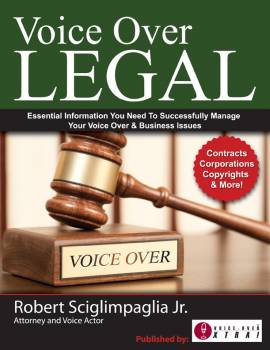|
BUSINESS Are There Benefits To Incorporating Your Voice-Over Business? Yes! Your Options Are ... October 30, 2018  Note: This valuable advice is reprinted with permission from excerpts from Voice Over LEGAL, the essential guide to managing voice-over business and legal issues. Note: This valuable advice is reprinted with permission from excerpts from Voice Over LEGAL, the essential guide to managing voice-over business and legal issues. By Robert J. Sciglimpaglia Jr. Attorney, voice actor, actor, author, producer The logic is: "Until I start to earn some money at this, what's the point of creating a formal business structure?" However, this same logic doesn't prevent many of those same voice-over artists from doing business under a "trade" or "stage" name, like "ABC TERRIFIC VOICE," or some other catchy phrase. This is what is referred to in the legal world as a "DBA" or "doing business as." Nor does the logic prevent voice talent from spending thousands of dollars on home studio equipment, training, production of demos and marketing efforts. These are all expenses that the talent believes will pose no problem when it comes to deducting them from income taxes. Even after many voice-over artists do start to earn income in the business, they still don't get around to setting up a more formal structure, and they only think about such things around tax time, or if they are ever subject to a legal action. YOUR OPTIONS EXPLAINED The question of whether to incorporate has been subject to much debate in the voice-over community. It is my firm belief, however, that there should be no debate about it whatsoever. The question should not be whether to incorporate, but rather, how best to incorporate. Just like engaging in any type of business venture, a decision needs to be made about what "form" the business will take. Your options are:
Helpful IRS Definitions:
BENEFITS OF INCORPORATING In my opinion, the benefit of the cost of setting up a formal entity, like an LLC or corporation, far outweighs the potential cost involved in defending a lawsuit or action by the IRS. In some cases, it will also save the voice-over artist at tax time, depending on the revenues generated from the voice-over business. In fact, an LLC is extremely simple to set up in almost all states and, unless a voice-over artist has employees working for the LLC, it doesn't even require a separate Employer Identification Number (EIN) like a corporation would need. FOR THE VOICE-OVER ARTIST One of the many other
advantages of setting up an LLC applying specifically to voice talent is
that, in most states, it eliminates the need to file a "Trade Name
Certificate" or "Fictitious Name Certificate" to use the "DBA" name (as
mentioned above). Most states require individuals who are operating as a
sole proprietorship under a name other than their proper legal name to
file a form with a designated governmental entity. This includes fancy
names like "ABC Terrific Voice" or a "stage name" – that is, a name
other than the voice-over artist's legal name. Filing to become an LLC
eliminates this requirement in most jurisdictions because the LLC
paperwork is filed with the Secretary of State, and is deemed to be
notice of a "trade name" in that state. This would equally apply to
doing business as either an S or a C corporation. The failure of a sole
proprietor to file such a "trade name" certificate can result in
punitive damages, and can even result in criminal proceedings in some
jurisdictions. PROTECT YOUR ASSETS In short, some form of corporate structure should be the
first step in protecting a voice-over artist's personal assets (in the
unfortunate event that he or she issued). It also eliminates the
problems mentioned above concerning operation as a "DBA." Which type of corporation is right for you depends on your individual legal and tax circumstances. Speak to a qualified attorney and tax advisor to decide which one will serve you best. As a voice-over artist, I agree in theory with the statement I often hear from other
voice-over artists that "this is a liability-free industry." As an
attorney, however, I know better than that! The sad fact in the United
States these days is that whenever money changes hands or an injury
occurs, the potential for a lawsuit exists. -------------------------  ABOUT ROBERT ABOUT ROBERTPracticing law since 1991, Robert J. Sciglimpaglia Jr. is an attorney admitted to the bars of Connecticut and New York, specializing in several fields including entertainment law where he represents actors, voice-over artists, musical acts and bands on issues including representation agreements, contracts and copyrights. He is also a professional voice actor, actor, producer and coach, and author of Voice Over LEGAL, the essential guide to managing voice-over business and legal issues, published by VoiceOverXtra. Email: robscig@usa.net Web: www.robpaglia.com Voice Over Legal: www.VoiceOverLegal.com |
Tell Us What YOU Think!
Please Note: Since we check for spam, there will be a slight delay in the actual posting of your comment.
Comments (1)
~joleene
10/30/2018 at 12:09 PM
Rob, I greatly appreciate this information and... your constant willingness to share your expertise with us. I had some concerns about the affects of the new 2018 tax laws on an LLC. However, you've made it easy to understand. Thank you!










click for new article alerts